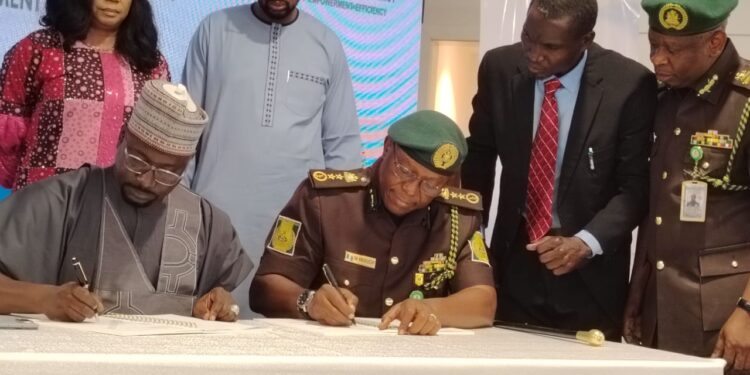The Nigeria Correctional Service (NCoS) and the Rural Electrification Agency (REA) have signed a Memorandum of Understanding (MoU) to deploy renewable energy infrastructure and training centres across custodial centres nationwide.
Speaking during the event in Abuja on Monday, the Controller General of NCoS, Sylvester Nwakuche, said the MoU signified more than infrastructure provision.
Nwakuche said that it also represented hope and a second chance for over 81,000 inmates in correctional custody across Nigeria.
He said that the partnership, themed “Strengthening Partnerships for Sustainable Energy Access and Socio-Economic Development,” was aimed at improving the quality of life for inmates.
He also said that the essence was to enhance rehabilitation through access to electricity and promote sustainable development within correctional facilities.
“Over 81,000 of my sons and daughters are incarcerated in a community that is often forgotten in demographic findings, forgotten when larger society is making progress
“We are not just signing an MoU today. We are leveraging a collaboration that will provide renewable energy, support rehabilitation, and enhance vocational training within our facilities,” he said.
Nwakuche expressed deep appreciation to REA for extending this support to inmates who were often excluded from national development priorities.
He also noted that some inmates had already received the news of the partnership and were excited about the new opportunities it would bring, especially regarding education and empowerment upon release.
“We invite those who bring light to also bring life. Today, we are not just empowering infrastructure; we are empowering lives.
“Some of them heard we are coming to bring them not just power but something that will help and empower them even after they leave custody,” he said.
What REA MD said:
In his presentation, the REA’s Managing Director and CEO, Abba Aliyu, emphasised that the agency signed MoUs not for ceremony, but as a commitment to action and accountability.
“At REA, we sign MoUs to make ourselves accountable to the Nigerian public,” he said.
Aliyu cited previous MoUs signed by REA that have yielded concrete results, including collaborations with Huawei to establish Nigeria’s first Testing and Simulation Centre.
This, he said, included over 20 renewable energy service companies to catalyse equity and debt financing.
“We have catalysed over N100 billion in debt financing from First City Monument Bank (FCMB) and secured $20 million in debt financing from the International Finance Corporation (IFC),” he said.
Aliyu also noted REA’s successful partnership with the Police Trust Fund, through which four smart police stations have been deployed and are currently operational across the country.
He said that the MoU with NCoS represented a unique opportunity to extend similar gains to correctional institutions, which have historically been excluded from energy development.
“For the first time, we are deploying renewable infrastructure to power this community, to ease their living conditions and to enable inmates to use their time meaningfully,” he said.
Aliyu said that the new partnership would involve the deployment of renewable mini-grids in correctional facilities and the establishment of renewable training centres within custodial communities.
He acknowledged that the NCoS had already partnered with the National Open University of Nigeria (NOUN) to make educational programmes accessible to inmates.
“Such efforts cannot succeed without electricity. This is because these courses are all online, and without electricity, it is not possible to achieve that.
“We are going to replicate what we did with the Police Trust Fund, only this time in correctional institutions. It’s not just about lighting up the space, but enabling transformation, “he added.
What you should know
The REA has stated it plans to provide electricity to 25 million Nigerians within the next three years.
In April, REA signed grant agreements with nine renewable energy companies to provide electricity access to 17.5 million Nigerians














